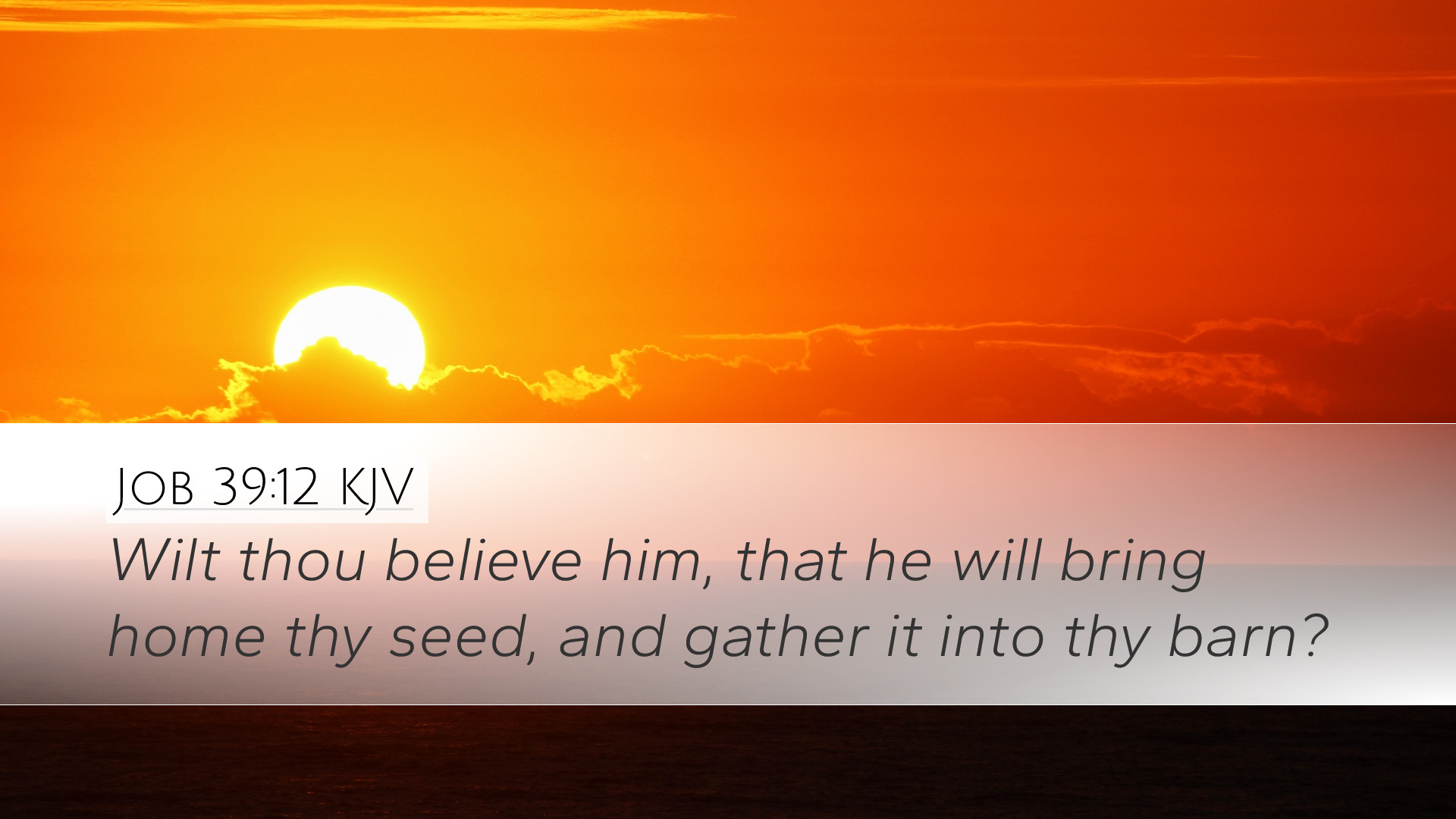Old Testament
Genesis Exodus Leviticus Numbers Deuteronomy Joshua Judges Ruth 1 Samuel 2 Samuel 1 Kings 2 Kings 1 Chronicles 2 Chronicles Ezra Nehemiah Esther Job Psalms Proverbs Ecclesiastes Song of Solomon Isaiah Jeremiah Lamentations Ezekiel Daniel Hosea Joel Amos Obadiah Jonah Micah Nahum Habakkuk Zephaniah Haggai Zechariah MalachiJob 39:12
Job 39:12 KJV
Wilt thou believe him, that he will bring home thy seed, and gather it into thy barn?
Job 39:12 Bible Commentary
Commentary on Job 39:12
Verse Context: Job 39:12 states, "Wilt thou believe him, that he will bring home thy seed, and gather it into thy barn?" This verse is part of God’s response to Job as He enumerates the wonders of His creation, demonstrating His sovereignty and omnipotence.
Interpretation and Themes
This verse raises profound questions about faith, reliance on God, and understanding His ways in contrast to human understanding. God emphasizes the importance of trust in Him, especially when His purposes are beyond human comprehension.
- Divine Sovereignty: The verse highlights God's control over the natural world and His ability to provide for His creation. The rhetorical nature of the question serves to remind Job (and the reader) that God has everything under His dominion.
- Human Inability to Grasp Divine Intent: Job is challenged here to recognize the limits of human wisdom. Just as a farmer must rely on the seasons and the Lord for a harvest, so too must Job depend on God’s greater plan, which he cannot fully comprehend.
- Faith in God's Provision: The reference to gathering seeds into the barn symbolizes the hope that God will provide. This can be applied to life’s uncertainties, where faith assures believers of God’s continued provision in their lives.
Insights from Public Domain Commentaries
Matthew Henry
Matthew Henry highlights the significance of this verse in relation to God’s response to Job’s earlier complaints. Henry delineates that God’s query serves as a gentle reminder of the limitations inherent to Job’s understanding.
Henry notes that the harvesting imagery evokes the image of labor and the necessary trust in divine timing. Just as the farmer must believe in the changing seasons and the providence of God for a fruitful harvest, so too must Job maintain his trust during seasons of personal trial.
Albert Barnes
Albert Barnes delves deeper into the implications of trusting God in the midst of suffering. He points out that just as one must depend on God for the natural order, Job must recognize that his life and circumstances are woven into a greater narrative that he may not yet understand.
Barnes asserts that God asks Job whether he will bring these seeds home, metaphorically questioning Job's faith in God's promise to provide. This illustrates the broader theme of reliance on God’s promise amid uncertainty.
Adam Clarke
Adam Clarke adds a layer of understanding concerning the metaphor of “bringing home thy seed.” He positions this verse within the agricultural society of the time, suggesting that the metaphor would resonate deeply with Job. Clarke interprets this act of gathering as a promise of sustenance and future hope.
Clarke emphasizes the necessity of faith in God's plans, urging readers to recognize that God ensures the completion of His work even when we face adversities. He encourages the faithful to trust in God’s perfect timing and providence.
Theological Reflections
The theological implications of Job 39:12 are profound. This verse serves as an invitation to reflect on God's goodness and faithfulness even amidst trials. Ensuring a bountiful harvest is not merely a matter of hard work but involves divine cooperation between the earth and Creator.
- Trust During Trials: The believer is called to trust that God will fulfill His promises, even when circumstances seem dire or incomprehensible.
- God's Omniscience: Understanding that God knows what we cannot see encourages humility and reliance on His wisdom.
- Encouragement for Perseverance: The imagery can serve as a reminder to endure through hardships with the hope of divine restoration and blessing.
Conclusion
Job 39:12 serves not only as a reflection on God’s sovereignty but also as a pivotal point for the believer's understanding of faith and trust. In it, both Job and the reader are invited to engage with the truth that God is actively involved in creation and in their lives, orchestrating events for His glory and their ultimate good.
The insights from Matthew Henry, Albert Barnes, and Adam Clarke enrich our understanding of this verse, reminding us that while we may not always see the full picture, our trust in God’s goodness is paramount. As we navigate life's uncertainties, may we find confidence in the promise that He will indeed bring home our seeds and gather them into His barn, affirming our faith in His divine providence.


